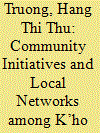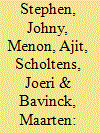|
|
|
Sort Order |
|
|
|
Items / Page
|
|
|
|
|
|
|
| Srl | Item |
| 1 |
ID:
175098


|
|
|
|
|
| Summary/Abstract |
Over the last two decades, coffee growers in Vietnam have faced the same problems as farmers all over the world. Ethnographic research among the community of K’ho Cil coffee growers in Lam Dong Province from 2016 to 2018 documented local initiatives to deal with the problems through the establishment of a K’ho Coffee network, revitalization of traditional production patterns, local integration into the global coffee commodity chain and agritourism entrepreneurship. Conceptualizing the way local K’ho Coffee growers generated and implemented the initiatives, this paper argues that by utilizing their social network, local farmers revitalized their economic production. Negotiating a decent collective position in the world system of the coffee commodity chain offers them a chance to survive the influx of economic deregulation and avert the impacts of climate change.
|
|
|
|
|
|
|
|
|
|
|
|
|
|
|
|
| 2 |
ID:
181782


|
|
|
|
|
| Summary/Abstract |
Energy Community Initiatives (ECIs) present important beacons in moving to a more sustainable energy provision at household level. The success of ECIs, however, depends on how they are framed as socially acceptable in and around the locations where they are active. Using framing analysis, this paper examines the framing of three urban and seven rural Dutch ECI cases in the period 1989–2017. Key questions are: how have Dutch ECIs been framed in the regional and national press through time, concerning their (positive) contribution to the energy transition and their support, versus (negative) perceptions of ineffectiveness and resistance? Second, to what extent does framing manifest spatial (urban versus rural) and scalar (regional versus national) patterns and divides? The data consists of 527 newspaper expressions focusing on six themes (economic, environmental, social, political, local-development, innovation). Results show that ECIs generally meet a positive framing, emphasizing economic, environmental and community benefits. However, this positivity is primarily related to the instrumental need for ECIs to prove community acceptance rather than exposing ECIs’ strategic roles in promoting the energy transition. Only in urban centres we find relatively more attention for ECIs’ transformational role. We suggest that the energy transition still stands to benefit from a stronger advocacy of ECIs’ contribution notably through a better strategic and spatial framing. This may serve to overcome continuing resistance in more rural locations.
|
|
|
|
|
|
|
|
|
|
|
|
|
|
|
|
| 3 |
ID:
120216


|
|
|
|
|
| Publication |
2013.
|
| Summary/Abstract |
This article examines how the politics of scale affect a process of dialogue led by civil society actors over fishing conflicts taking place at the local level in South Asia. The location is the Palk Bay and the fishers are Tamils from India and Sri Lanka. An agreement over fishing rights reached between these fishers in August 2010 remains largely unimplemented, but takes centre stage for this article, which examines the negotiation processes in terms of politics of scale and highlights the various difficulties encountered. Major pitfalls in a dialogue of this sort are the failure to recognise diversity within the population(s) involved and lack of recognition of the linkages of this population with other actors at different scales or levels. In a transboundary context, national and regional identities at times override local identity and interests, thereby making locally constructed solutions difficult, if not impossible, to implement.
|
|
|
|
|
|
|
|
|
|
|
|
|
|
|
|
|
|
|
|
|